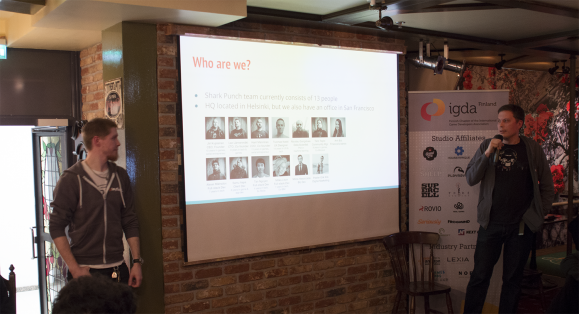Audience question: Is not being a woman in the game industry also leverage? Is it really a problem to enter the industry? In the mobile side more women play, and a good CEO would hire more women.
EK: I never felt it, I often felt boxed in. In Wooga there was one instance where I was not a fit for the team.
SÄ: Experience is what matters.
KK: When doing interviews in the US, I had a guy with me, and all the media people talked to the man. In Finland I can sometimes be seen as just a companion to someone, that I’m not someone who “works here”. When it comes to mobile games, the diversity still needs to be there. What is a benefit to me is that people remember me, because I look different. But sometimes I need to explain that I’m not “a lady who only plays causal games” (although I like them too). I often need to explain my game preferences.
EK: All people get boxed in, for example there are dress codes: T-shirt and hoodie. If you put on something “girly” it stands out in a NOT positive way. You have a feeling you should not draw attention to yourself.
Audience question: Will women steal our jobs? Is there such a fear? In some industries there is much resistance to let women in (tech, sports etc). What annoys you the most about this? How could men help?
EK: Just treat us like professionals. I’m just a human.
KK: We’re all human. Ask questions, get to know us. We all have prejudices, then we get past them.
AB: We are not that scary.
EK: And don’t get drunk and tell us we are cute!
Audience question: I work in the car industry, which is also very male dominated. You know the idea of ladies posing next to cars, have you encountered uncomfortable sexualized stuff in games?
KK: In games conferences there have been incidents with ladies in bikinis. In some countries this is more common, but in for example Sweden they are much more sensitive, never anything offensive.
SÄ: 15 years ago it was much worse. Boobs. Now not so much. The world is changing. There are many genres now, and also “boob games” for those who want that.
EK: All of the Internet… The most annoying thing is that the sexualized stuff excludes people who don’t enjoy that.
AB: A beautiful picture sells better, gender is not always the thing.
Audience question: People are often surprised at female members in E-sports teams. How will women be part of the game industry in the future?
EK: It is unstoppable progress. One day women, and all sexes, will be a normal thing in the industry. It is only a matter of time, but it is good that there are people who criticize the situation now. This normalizes the idea of women in the game industry.
KK: It is a matter of the amount of players growing. The industry needs to make more diverse games, for different players. In 10-20 years the problem will be over. There will be more people with skills that can enter the E-sport scene, they will have more training. There’s a lot of stuff around games, streaming and so on.
EK: This notion of the “gamer”, there is no such stereotype anymore. In the future games are no longer some precious guarded playhouses.
Audience question: A producer asks: do you always have to be either an artist or a programmer? What other jobs are there?
SÄ: There are many more roles now: monetization, analytical skills, producers don’t need to know programming. You don’t even need a certain kind of background, I know one designer who used to be a librarian. Get experience in order to grow into the role you wish to land.
EK: Data is huge. Communication – engaging the community, being a buffer between audience and developers. Producing videos…
AB: Games have become bigger and more interdisciplinary. Only a programmer cannot make games for a bigger audience. There is also a need for team managers, because teams are bigger.
Audience question: About genres, there are untouched markets in PC. A lot of the games are still marketed for a certain kind of male. So many genres are not explored at all! What genres could be more explored, are there some that are more easily targeted to women?
SÄ: As an investor, and knowing investors: they invest in less risky genres. It is hard to get funding for new stuff. New genres need entrepreneurs pushing new ideas. It takes a lot of time.
KK: Yes, it is difficult to get investments for totally new ideas. Some genres are insanely expensive. With a shoe string budget you make something small, and see if it sells. Simulations you can make with a small team, but they appeal to a wide audience. What do the players actually want? Money and hours go into investigating what appears to be “untapped areas”. Cities: Skylines filled such a segment.
AB: You need money to support the team, and you need to compromise – make small changes to existing genres. New genres are too risky.
EK: indies and hobbyists can push the envelope. There are new areas to explore in art installations using game mechanics for example. New tech, VR, big IP’s like Pokemon GO can bring in new things.
Audience question: about stories, and the cliché “the scruffy white guy”. Are you accused of pandering when you don’t use that cliché?
EK: Well, look at the Remedy office and the huge posters… We have had a discussion in the company, that maybe we are finished with telling the story of the “anguished white man”. I’d love to do something different…
KK: In teaching, when students use this cliché, I ask: is this the most interesting character? Would you get new players with another kind of character? Would something else be valuable? You get a tiny extra bit of attention with other characters…




























































